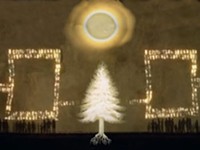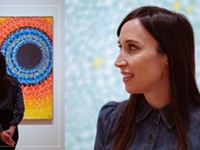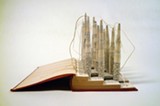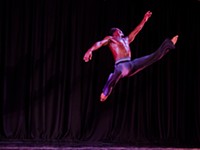[
{
"name": "500x250 Ad",
"insertPoint": "5",
"component": "15667920",
"parentWrapperClass": "",
"requiredCountToDisplay": "1"
}
]
The ways in which we realize that we are powerful beings through sexual expression are manifold and complex, but can probably be filtered down into two groups. The most basic, of course, is yielding to the undeniable animal drive to eject our genetic material (more immediately for men, then later for ladies, via birth). The other is the magnificence of sharing this connection with another human being who we care for deeply.
Over the years the potential for the individual to actualize this power has been minimized through body shaming. Cultures began putting names and categories to certain actions and relationships, telling us that some are off-limits, filthy, evil. Bookmaker Scott McCarney's work deals with the long, difficult path toward making sense of, defying, and even mocking these imposed limitations. His current show at Visual Studies Workshop serves not only to transform old definitions into new narratives, but also to deal with past and ongoing fear mongering as expressed in religious and political realms.
In "Reversing the Catastrophe of Fixed Meaning," McCarney doesn't mince words even as he literally dices up old texts, transforming encyclopedias, bibles, and other printed documents that have attempted to pin human culture to permanent modalities. In the case of religious guidebooks, the modes have never really fit everyone, and they exerted the same shackles on past human beings that they attempt to exert today.
In his works of textual deconstruction, McCarney mimics what gays must literally do: rearrange existing structures to redefine the space for themselves within the broader culture. In "Gay Courage," a window is cut in a book cover to reveal layers of cut paper and a fit young boxer busting through bars of text. Through his silhouette, we glimpse a couple of young men locked in a kiss in front of a crowd.
Many of McCarney's works are embedded with bits of pornographic imagery and suggestive fragments of text, "ornamented with the most superficial and easily decoded allusions to gay sexuality — just as the campiness that was the hallmark of gay culture is eroding as our visual environment has become saturated with explicitness," says guest curator Cyril Reade, professor of art history at Rutgers-Camden and director of the Rutgers-Camden Center for the Arts. "The New Wonder Book Cyclopedia of World Knowledge Vol. XI (SPA-TRE)" is mounted to the wall, its binding a phallic explosion of a rocket, train, and the surging prow of a ship. The covers contain circular cut-outs, revealing bits and pieces of orifices, fingers, eyes, and all manner of erogenous zones, while bits of text peek through and speak of sublimated yearning. The whole work transforms the viewer into voyeur.
Other works, such as "Multiple Orgasm," are more symbolically erotic. The open text's pages are cut into a terraced landscape, with "rolled paper pipes erupting from the holes drilled into the paper bed and unleashing raw linen threads," says Reade.
McCarney's love of visual vengeance is expressed in an altered Book of Mormon, as well as "Bible for Terry Jones," named for the Qur'an-burning pastor and presidential candidate. The book is covered with matches that form a cross, and is propped on a metal case.
A row of altered books bring humor back into picture. In "Dickheads," the faces of Adolf Hitler, General Douglas MacArthur, and others are replaced by flesh mushrooms. Nearby is "Types of Helmets," in which a grid of headgear illustrations where penis heads have replaced all of the faces is flanked by two works entitled "C-Men." The left side is a grid of text with eyes peeking through cut holes, the right side with one-eyed-willies doing the same.
McCarney's show also includes blasts at homeland security and political fearmongering, with works that mimic elevated terrorist risks, and "Safe," a flip-through exploration of how American culture and government has minimized our capacity and willingness to trust and care for one another. The latter comes with a dedication to the artist's partner for being his sanctuary.
This year, perhaps more than any other, is proving to be the year of the gay voter and consumer, and everyone from President Obama to JCPenney is making sweet, commercial love to a portion of the population whose tides of support are at last rushing in to drown its detractors. McCarney's works go for the throat of religious politicians who pretend to preserve the family, but his silence regarding the gay marriage-supporting incumbent presidential candidate indicates his preference. McCarney's oeuvre is representative of our quickness to trust seemingly progressive politicians.
"Knowledge is not bound to the medium that distributes it," writes curator Reade. In many ways, human culture insists upon clinging to obsolescence. Reject outdated manuals and write your own. Or, if we must look to a guide, take a page from Darwin's book: survival of the fittest means that those who adapt best to change — inevitable change — will endure.
Scott McCarney will join curator Cyril Reade in conversation Thursday, June 28, 7 p.m., as part of the Photo-Bookworks Symposium at VSW (June 28-30). For more information visit vsw.org.
Latest in Art
More by Rebecca Rafferty
-

Beyond folklore
Apr 4, 2024 -

Partnership perks: Public Provisions @ Flour City Bread
Feb 24, 2024 -

Raison d’Art
Feb 19, 2024 - More »






